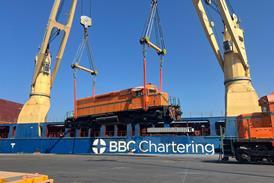US President Joe Biden issued an executive order to tackle anti-competitive practices in parts of its economy. Among the broad-ranging remit, the government is tasking the Federal Maritime Commission (FMC) and the Surface Transportation Board (STB) to come up with solutions to the surging costs shippers presently face.
According to White House press secretary Jen Psaki, this effort has three goals: lower prices for consumers; higher wages for workers; and more innovation and economic growth.
On July 12, the FMC and the Department of Justice Antitrust Division signed an interagency memorandum of understanding (MoU) to “foster increased cooperation and communication in their respective oversight and enforcement responsibilities of the ocean liner shipping industry”.
Prior to the signing, FMC chairman Daniel B Maffei said: “In recent months, we have increased our scrutiny of the ocean carrier alliances to identify evidence of anticompetitive behaviour regarding rates and capacity, and we will continue to do so as the COVID-19 and import surge crisis continues. We welcome the assistance and cooperation from other agencies, including the Department of Justice.
“With regard to detention and demurrage charges, it remains a top priority of the agency to identify and take action against those who flout the Commission’s recent interpretive rule on reasonable regulations and practices.”
This is not the first time that the US government has taken aim at the shipping industry. However, it would be unfair to say that today’s congestion is borne of anti-competitive practices.
According to the World Shipping Council, ocean carriers are employing all available capacity and pulling out all stops to manage the operational disruptions brought on by Covid-19. Nevertheless, a sustained increase in US consumer spending on goods has the supply chain bursting at the seams.
In a recent assessment of market conditions, Drewry Shipping Consultants said: “The surge in Asian exports being shipped to North America continues unabated. In the first three months of 2021, eastbound volumes grew by 34 percent - the highest quarterly gain by far since Drewry’s current records began in 1995.”
The disruption facing the sector is not the result of any one supply chain actor, said John Butler, president and ceo of the World Shipping Council. “Supply chains simply cannot efficiently handle this extreme demand surge, thus resulting in the delays, disruptions and capacity shortages felt across the chain. All supply chain players are working to clear the system, but the fact is that as long as the massive import demand from US businesses and consumers continues, the challenges will remain,” he explained.
That being said, the FMC has ample authority to handle detention and demurrage disputes. If cargo owners do not return equipment on time, that equipment is not available for another customer to use.
“We agree with the White House that the FMC has the tools to investigate and is the appropriate authority to take action on any issues when it comes to detention and demurrage. Shippers can report any irregularities so that they are properly investigated, and action taken against any improper practices,” Butler said.
















